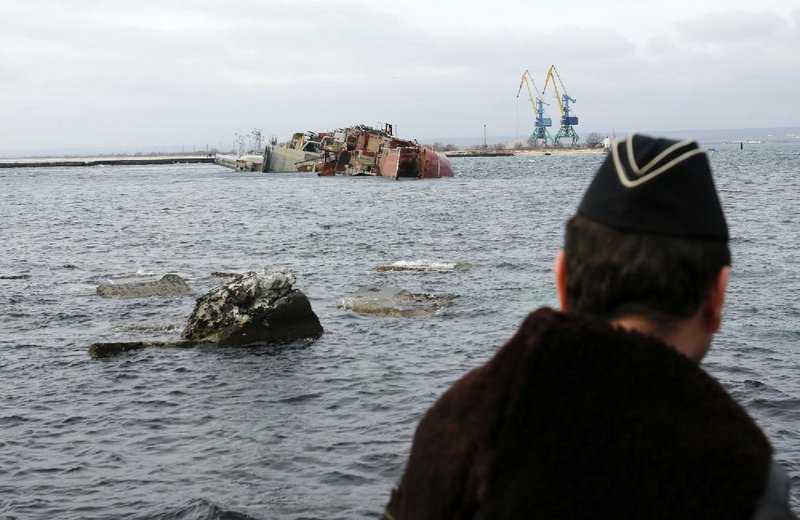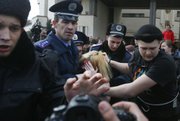SIMFEROPOL, Ukraine - As the pro-Russian authorities in Crimea pressed ahead Thursday with measures to break away from Ukraine and become part of Russia, U.S. President Barack Obama said their plans for a referendum would “violate the Ukrainian Constitution and violate international law.”
RELATED ARTICLE
http://www.arkansas…">Russia galled as U.S. order sets visa ban
The developments came as the United States and the European Union moved to provide new support for the national government in Kiev and sought ways to press President Vladimir Putin of Russia to de-escalate the crisis in Ukraine.
Obama said in Washington: “Any discussion about the future of Ukraine must include the legitimate government of Ukraine. We are well beyond the days when borders can be redrawn over the heads of democratically elected leaders.”
The pro-Moscow authorities in Crimea, and the Kremlin itself, seemed to be undeterred by pressure and criticism from abroad. They moved to tighten their grip on the Crimean peninsula, where Ukrainian military installations are under a blockade by Russian forces.
The regional parliament in Crimea, which is a semi-autonomous region, said Thursday that a referendum would be held March 16, two weeks earlier than initially planned, offering people in the region a choice of remaining part of Ukraine with greater independence from Kiev or joining the Russian Federation.
“This is our response to the disorder and lawlessness in Kiev,” said lawmaker Sergei Shuvainikov. “We will decide our future ourselves.”
The referendum, rejected by Ukraine, had originally been set for March 30.
The City Council of Sevastopol, which has a separate legal status from the rest of Crimea, took matching steps Thursday, voting to hold a similar referendum March 16. Pro-Russian demonstrators outside government buildings in the city cheered the news and regarded secession from Ukraine as a foregone conclusion.
“We’re already Russian,” Natasha Malachuk said as she picketed a local security headquarters.
Another protester, Vyacheslav Tokarev, declared, “We’re citizens of Russia; we’re returning home.”
Astrid Thorns, the commissioner for national minorities for the Organization for Security and Cooperation in Europe, said in Kiev that after four days in Ukraine, she had found “no evidence of violations or threats to the rights of Russian speakers” in the country. Rather, she said, there was a risk of violence against the Tatar minority group in the mainly ethnic-Russian Crimean peninsula.
Putin has used fears about the safety of Russian speakers in Crimea as a justification for Russian intervention in the region.
In February, dozens of anti-government protesters in Kiev were killed by forces loyal to Viktor Yanukovych, the pro-Kremlin president who then fled for Russia. The interim government that took over in Kiev is regarded by Russia and many in Crimea as illegitimate.
In Simferopol, Crimea’s capital, about 50 people rallied outside the local parliament Thursday waving Russian and Crimean flags. “Russia, defend us from genocide,” one poster read.
“Only Russia can give us a peaceful life,” declared 35-yearold Igor Urbansky, one of the rally participants.
“We are tired of revolutions, maidans and conflicts, and we want to live peacefully in Russia,” he said, evoking the name of the Maidan, the downtown square in Kiev where tens of thousands of protesters contested the rule of Yanukovych.
Still, not all in the city favored the lawmakers’ vote to secede from Ukraine.
“This is crazy. Crimea has become Putin’s puppet,” said Viktor Gordiyenko, 46. “A referendum at gunpoint of Russia weapons is just a decoration for Putin’s show. A decision on occupation has already been made.”
A court in Kiev already has ruled that the Crimean parliament’s actions are broadly illegal. An arrest warrant has been issued for the new prime minister of Crimea, Sergei Aksyonov, who heads a political party called Russian Unity and who was installed a week ago after armed men seized the parliament building and raised the Russian flag.
Despite such measures, Crimean lawmakers also said Thursday that they had approved a resolution seeking membership in the Russian Federation.
Officials in Simferopol said the resolution was a required legal precursor to calling a referendum.
Meanwhile, in Moscow, a prominent member of Russia’s parliament, Sergei Mironov, said he had introduced a bill to simplify the procedure for Crimea to join Russia and said it could be passed as soon as next week. Another senior lawmaker, Leonid Slutsky, said the parliament could consider such a motion after the referendum.
Earlier this week, Putin said Russia had no intention of annexing Crimea, while insisting its population has the right to determine the region’s status in a referendum.
European and Ukrainian authorities rejected the latest moves, saying they violated the Ukrainian Constitution and represented the views only of pro-Russian lawmakers in Crimea.
“My position is that this referendum is unconstitutional,” Ukrainian Economy Minister Pavlo Sheremeta said.
A senior European official said Ukraine’s Constitution required any change of territorial sovereignty to be put to a vote of all Ukrainians, not just those in one region.
In Moscow, Dmitri Peskov, a spokesman for Putin, was quoted by Russian news agencies as saying the Kremlin had been informed of the developments in Crimea but had no further comment. Prime Minister Dmitry Medvedev said Russia would simplify the procedures for people who have lived in Russia or the former Soviet Union to secure Russian citizenship.
Ukraine’s interim prime minister, Arseniy Yatsenyuk, who was attending a EU meeting in Brussels, reiterated his call for the Russian government to order Russian military forces back to their barracks in Crimea and to withhold support of “the so-called government of Crimea.” He said the planned referendum in Crimea was “an illegitimate decision.”
“This referendum has no legal grounds at all,” he said.
Putin, he said, is trying to build a new Berlin Wall.
With echoes of President Ronald Reagan at the Brandenburg Gate in Berlin during the Cold War, Yatsenyuk said, “I would like to say to Mr. Putin, ‘Tear down this wall, the wall of intimidation, of military aggression.’ We are ready for cooperation, but we are not ready to surrender and be the subordinate of Russia.’”
In Crimea, Russian and pro-Russian forces maintained a blockade of Ukrainian military facilities. Crimea’s leader has said pro-Russian forces numbering more than 11,000 also control all access to the peninsula in the Black Sea.
At the Ukrainian naval base in Novo-Ozerne, the inlet leading to the Black Sea was blocked Thursday by a partially submerged Russian naval vessel, preventing two Ukrainian ships from leaving port. Ukrainian sailors said the Russians had blown up the decommissioned vessel overnight.
Western officials expressed concern that Russia may also move forces into eastern Ukraine, another area where most of the population is ethnically Russian.
In Donetsk, a major city in the east, a tug of war between rival protesters extended into Thursday when the Ukrainian police ordered pro-Moscow demonstrators, including Pavel Gubarev, the so-called people’s governor, to leave the city’s administration building.
Police parked heavy trucks at the entrances to the building to prevent the pro-Moscow group from trying to retake it, witnesses said, and the Ukrainian flag was hoisted anew. The pro-Russian demonstrators, who want the city to cut ties with the national government in Kiev, had flown the Russian flag at the building.
Hundreds more pro-Russian demonstrators clashed with the police outside the local headquarters of the national security service in Donetsk, blockading a police bus with parked cars and derailed trolleys and forcing the police to release protesters who had been detained.
Later Thursday, Ukrainian security officials said that Gubarev had been arrested. Police said he was under investigation for calling for Donetsk to secede from Ukraine and for capturing government buildings.
Senior U.N. officials who are in Ukraine trying to broker a solution to the political crisis, including the deputy secretary-general, Jan Eliasson, and the special envoy, Robert Serry, are due to leave shortly, a U.N. spokesman said Thursday, apparently signaling the end of the effort.
The spokesman, Martin Nesirky, said and Serry, who was accosted by armed gunmen Wednesday in Crimea and forced to abort his visit there, will return to his post as the organization’s special envoy to the Middle East peace process.
Another U.N. official - Ivan Simonovic, the assistant secretary-general for human rights - was scheduled to arrive in Ukraine on Thursday on what the organization called a fact-finding mission.
Meanwhile, Interpol is studying a request by Ukrainian authorities to issue an alert for Yanukovych’s arrest on charges of abuse of power and murder, the international police organization said Thursday.
The organization said it received a request Wednesday from Ukrainian authorities to issue a “Red Notice,” which informs Interpol’s 190-member countries that a person is wanted in his home country, and seeks the person’s location, arrest and eventual extradition.
Details of a valid arrest warrant by Ukraine are among the things needed to trigger a Red Notice alert for Yanukovych.
The request “is being assessed” to see if it is in line with Interpol’s constitution and rules, the statement said.
Information for this article was contributed by David M. Herszenhorn, Alan Cowell and Andrew Roth of The New York Times and by Juergen Baetz,Yuras Karmanau, Sergei Chuzavkov, Dalton Bennett, Julie Pace, Lara Jakes, Vladimir Isachenkov, David Rising, George Jahn, Angela Charlton and staff members of The Associated Press.
Front Section, Pages 1 on 03/07/2014



